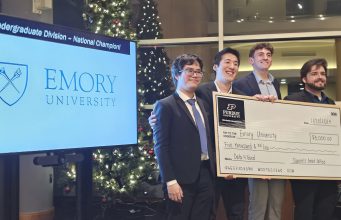Climate change, the infamous and lingering uncomfortable truth that so many choose to ignore like overdue homework, is here to stay—so much so that it has started to permeate business as an investment risk. The SEC is beginning to assess how companies need to report on their climate change efforts and carbon emission footprints.
It is up to us, as future leaders, to determine what role we will play in the transformation of a more sustainable business horizon and, in time, guide our community and schools.

This is by no means a simple task. Change requires a holistic view, as narrow actions do not solve the issue (and can even worsen the problem) and requires collaborative action to reduce disparities set off by climate change and gain massive buy-in from all stakeholders. When I was appointed managing partner of Goizueta Impact Investors (GII), the Class of 2022 board decided to include within our mission and vision not only a social impact but also a direct tie into Environmental, Social, and Governance (ESG).
We firmly believe there is a tie between equity, climate change, and investing and as an investment club with a social mission, it was vital to make this change.
ClimateCap reinforced our decision to include climate as a core value of GII. It was refreshing to attend ClimateCap alongside fellow GII delegates and find a deep conference that did not shy away from the discussion of difficult subject matters alongside other top MBA programs.
Now more than ever, there is a need for a new type of leader whose job function will be formed by the advent of a new business school curriculum. The demand for green skills, sustainable mindsets, and climate-related jobs is on the rise. However, it is important to highlight that regardless of your function, if you ask the right questions any role can bring that sort of mentality to bear and offer collaborative opportunities to solve this pressing issue.
As sustainability becomes a more prominent issue within organizations, more leadership will realize the need to break down the silos around the subject matter. The leaders of tomorrow will have to bridge these gaps across firms to achieve sustainability goals, a daunting feat.
In short: one does not have to be in ESG to make an impact, but the skillset will continue to become more and more sought after and invaluable across industries. The world needs these new leaders before it is too late.

Just Like Manners Maketh Man, Culture Maketh Business.
These new green leaders will spearhead the cultural and technological innovation processes firms will require to achieve sustainability goals. On the one hand, internal processes will have to identify material risk and growth opportunities that are environmentally sustainable and quantifiable. On the other, leaders will have to adapt to how customers define climate change and their needs and help address them. Green jobs will face external and internal pressures to achieve long-term sustainable change from a bottom-up and top-down approach. The firms that steward and foster these green leaders will undoubtedly enable and unlock the power of human ingenuity and rise above their competitors as climate change becomes more prominent. Then it will fall on the leaders and those with a passion for ESG to unlock the transformative power of people, customers, and firms to drive further innovative change and solutions. Doing good is good for business and we cannot give up the fight for a more sustainable world.
These future leaders will have to be, in a sense, climate entrepreneurs who are passionate, driven, willing to work together, and that do not quit until they find solutions to one of mankind’s most pressing problems. However, with $3.5 trillion in investment annually to achieve a net-zero economy by 2050 and not enough skilled professionals to lead these investments there are a lot of money and opportunities at the table for the taking. The question is: will current and future b-school students rise to the challenge?

I believe we will. The worst advice I ever got was “be realistic”, and the same applies to climate change. For days I shared a room and had stimulating conversations with students that will undoubtedly take on the roles to shape climate policy. Emory taught me to be intentional, to drive the change I want to see and work in a collaborative manner within a community that has made Atlanta a home away from home. We will be the generation that makes the world realize how sustainability is a good investment, we will educate consumers and our firms (both large and SMEs) will be clean not because the government told us to but because it is the right thing to do. If you come to Goizueta, you will certainly understand why you should always do the right thing.
The Business & Society Institute generates research insights that it employs in its teaching and programmatic work on the critical challenges that businesses and their stakeholders can address together, including climate change and energy systems; inequalities in organizations, markets, and communities, purpose-driven entrepreneurship and innovation, transparent trade, impact investing, and reimagined corporate responsibility. Learn more about the Institute.
About the author Camilo Guiterrez MD 22MBA/MPH: Guiterrez is an internationally-trained physician from Bogota, Colombia. He completed his medical studies at Universidad de los Andes where he focused on Orthopedic Surgery and was a senior research assistant at Hospital Universitario Fundacion Santa Fe de Bogota before transitioning into consulting. After applying to Emory’s MBA/MPH dual degree program, he interned at The Economist and later at Mckinsey & Co. He is passionate about strategy, finance, and the illiquid aspects of alternative investing.











